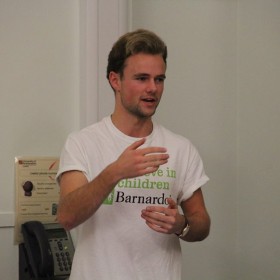Non-profit work is challenging. Unfathomably rewarding but challenging. If you’re considering a career in the non-profit sector, that’s brilliant! For me, there isn’t another sector or industry I’d rather be in because money isn’t my incentive to be productive and to work hard. The more productive I am, the happier I tend to be. With this in mind, working out what I wanted to do after graduating from University was all about finding a cause I would be motivated to work hard for.
As a recent graduate, I’m well aware of the pressure that comes with the University experience, and I hope that through this guide I can part with some of the lessons I’ve learnt and share some of the experiences that have been important for my success. Many young people don’t feel supported, believed in, or cared for, but more importantly it’s sadly the case that too many young people don't realise their potential. This guide attempts to outline how to realise your potential, set your sights on whatever it is that you want to achieve, and how to avoid burning out whilst doing so.
“5 missed calls, 27 unread WhatsApp messages, 4 texts you haven’t responded to, 4000 emails in your inbox, running out of clean clothes, with dirty clothes mountains constantly climbing. Only eating microwave meals, always rushing, always late, never anything less than exhausted, regularly under the weather. Stressed.”
If you’re doing well, don’t ever let yourself be in this place. If you’re already there, and you want to get out, start small and work on the things you can control. Identify attainable goals, and do your best to accomplish them. Work out what it is you prioritise outside of work related endeavours – for me, this is exercise.
In life, you get networking people, and hard-working people… I’m trying to be both. Over the past three years I’ve taken on an incredible amount of responsibility, through various roles in the non-profit sector, with my sporting interests, and with my undergraduate degree. I’ve put myself in stressful situations and I’ve tested my limits, but I have not yet taken on too much. I haven’t reached the point where I’m producing bad results, because my schedule is too busy, or my workload is too large. More importantly, I’m yet to ‘burn-out’; something which unfortunately happens far too often in the non-profit sector.
Many have doubted I’d handle this level of responsibility, many have questioned how I’ve managed to do this successfully, without any aspect of my health deteriorating significantly. Three things have allowed me to remain healthy in my pursuit of success:
- Prioritising - identifying the difference between that which you want, and that which you need.
- An understanding of the bigger picture - knowing that you’re moving in the right direction, towards wherever it is you want to go.
- An incentive - having something that drives you to produce results, rather than something that you have to force yourself to do.
The incentive is the most important of these three, because this is what will get you out of bed on the cold days, keep your head held high through the tough moments, and it’ll give you the faith to shake doubt away. What’s my incentive to work hard? Inclusion. For as long as I can remember I’ve felt uncomfortable whenever anyone was excluded from a situation. As I’ve grown older and experienced more of the world, it has become clear to me that life isn’t inclusive. Many people aren’t fortunate enough to have the same opportunities as others. For this reason, I enjoy working in the non-profit sector, on behalf of organisations striving to combat exclusion on the larger scale.
Having control over the three aspects I listed earlier has enabled me to be successful, to take on responsibility and to remain healthy while doing so. What do I mean by healthy, and successful? In my opinion, being healthy is about liking the person you see in the mirror and being successful is about knowing that you’re doing yourself justice, while moving forward. As far as I’m concerned, when you’re unhealthy, you’ll look at yourself and you’ll wish for the things you don’t have. Whereas, when you’re healthy you’ll be grateful for the things you do have, and the things you don’t have won’t be such a worry. For me, moving forward is trying new things, challenging yourself, and moving closer to goals you have identified.
I thought about writing this at the beginning but chose not to,I haven’t got it all figured out, I’m still making plenty of mistakes, and I certainly do not know it all! I wrote this with the hope that there’s a chance it’ll help someone who is struggling to remain healthy in their pursuit of success and not because I think I’m the most successful person to walk the planet, but because I’ve discovered what works for me. Before I found a role in the non-profit sector my life involved going out (clubbing/drinking) three to four times a week, playing sport and sleeping. I didn’t have any direction, any motivation. I didn’t care about much at all, aside from sport, and I generally felt like there wasn’t much of a purpose to my life – I wasn’t achieving anything, and I wasn’t moving forwards.
We’ve all had someone ask us what it is we want to do with our lives. I prefer to think about who I want to be, because if you can understand this, and stay true to it, the other stuff generally comes with time. I’ve found that if you can start making small changes, and being consistent with these, before you know it you’ll be in a routine. For example, I made a habit of clearing my room and tidying it before leaving the house for a lecture, or for work. Why? If I’m stressed at work, or worried about my degree, or tired by the time I get home, at least my room is one less thing to worry about. I’ve found that by taking this approach you can begin to feel on top of everything you can control, and you’ll gradually begin to realise that some things outside of your control aren’t worth worrying about. The key here is identifying what it is you can control and working hard to ensure you remain on top of this.
The way I see it, if you want something, chances are somebody else does too, and for this reason you’re going to have to work hard for it. I’ve learnt how to do that effectively, and I’m grateful to have been able to pass on the lessons learnt, and explain how some of the experiences I’ve had, have made me stronger in this area. The way that I work isn’t going to suit everyone, and I’d like to make it clear that my way certainly isn’t the only way you’re going to be successful. My definition of success isn’t necessarily the same as yours.
My last bit of advice is this: if it’s going badly, go back to basics. Do the simple things right. Take care of yourself, take control of that which you can and then understand that once you’ve done that you’re in a better position than you were before, – you’re moving forward. As Martin Luther King Jnr said:
“If you can’t fly, then run. If you can’t run, then walk. If you can’t walk, then crawl – but whatever you do, you have to keep moving forward.”
I’ve listed below a few of the things that have helped me remain healthy in my journey to success.
Tips/ideas to stay healthy and productive:
- Make effort your routine. My friends used to laugh at me, because everyday at 10:30pm an alarm on my phone would go off. Why? Because I’d worked out that I was more productive in the mornings, and especially so if I’d had a good night’s sleep. So, I made a change, and this change quickly became routine.
- Be proactive, not reactive. With anything you do that is important, have a plan. Plan for how you’ll respond when things go wrong, and the next time you plan, use the lessons learnt, and the experience gained to strengthen your plan.
- Make reminders. The more you take on, the more there is to forget. If you forget, you become unreliable – not a good reputation to have. I combat this by writing everything down. Until I realised this perhaps wasn’t the best thing, I would write absolutely everything I needed to remember on my hands/arms. Why did I do this? Because every time anyone asked me why there was so much written on my hand (this happened a lot) I would look down, and be reminded of the things I had to do. These days I use a notepad.
- Have a motivator. I’ve found little things can often be extremely helpful with regards to being consistent, and keeping on track. I’ve used a range of different motivators to keep me going: a necklace given to me by a family member (this sense of familiarity helped), a favourite lyric written on my left wrist, and favourite quotes from good role models kept on post it notes in my wallet. In my experience, these little motivators remind you of the things that are specifically important to you and help to push you through tough situations.
- Surround yourself with positive people who are also moving forwards. If you’re setting yourself a tough goal, it’s generally going to be the case that this goal is going to be difficult to reach if you don’t put the hours in. The more goals, or the tougher the goal, the more positive influences you’re going to need around you. Good friends will understand, and be proud of your efforts to better yourself, because they will want only good things for you. However, relationships/friendships are a two-way street, and if you want any relationship to last you’ve got to put the appropriate amount of time into bringing them forward as well.
- Look after yourself. A career is important, but not as important as your health. I’ve found that the healthier I am, the happier I feel, and the happier I feel, the more productive I am. So, in the interest of producing better results, I’d say that it’s worth looking after yourself.
- Know your priorities. Exercise is the thing I enjoy most, therefore I make this a priority. When I’m exercising I’m not worrying about anything, and I’m not doing it for any reason other than the fact that it makes me happy. If there’s something I need to do to reach my goal, then I’ll miss the TV show I wanted to watch, I’ll turn down the social drinks I wanted to go to. But, I won’t let exercise be absent from my routine because I understand how important it is for my happiness, and in turn for my health. I’ve found that the healthier you are, the more productive you will be.






0 Comments